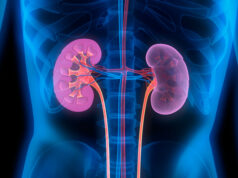
As more people become inoculated against Covid-19 and case numbers drop, providers are turning their attention to a perplexing subset of coronavirus patients: Covid-19 long-haulers.
Long-haulers are Covid-19 patients who contracted the disease and recovered but continue to experience symptoms, sometimes months later. To identify and accommodate the needs of this population, many prominent health systems have set up clinics dedicated to their care. Among them are Seattle-based UW Medicine and the Cleveland Clinic.
The symptoms range from fatigue and shortness of breath to memory issues and other cognitive deficits, said Dr. Aaron Bunnell, co-director of UW Medicine’s Post-COVID Rehabilitation and Recovery Clinic, in a phone interview.
Researchers estimate around 10% of Covid-19 patients experience persistent symptoms. The symptoms can linger for months, and physicians are just beginning to scratch the surface of the type of long-term care these patients will need.
UW Medicine’s long-haulers facility evolved from a post-intensive care unit clinic that the health system had set up last April. The post-ICU clinic was dedicated to caring for Covid-19 patients who had been hospitalized, Bunnell said. Over time, the clinic opened up to non-hospitalized Covid-19 patients and self-referrals.
Today, a majority of the patients coming into the clinic are those who were never hospitalized, Bunnell said.
UW Medicine clinicians have discovered that care for these patients involves a complex tapestry of specialists and care teams, including internal medicine physicians, psychologists, physiatrists, physical therapists and occupational therapists.
Similarly, clinicians at Cleveland Clinic’s reCOVer clinic, which opened a month ago, for Covid-19 long-haulers are collaborating with specialists from 18 different clinical areas, including cardiology, pulmonology and dermatology.
Patients seeking care at the reCOVer clinic first undergo a series of evaluations and exams, which can take several weeks. These evaluations include cardiac, pulmonary and physical therapy tests as well as behavioral health screenings. Then, the patients will meet with clinicians to discuss their results and their personalized care plan.
One of the challenges of caring for this population is that the chronic fatigue many of them experience prevents them from receiving evaluation testing, said Dr. Kristin Englund, an infectious disease physician who leads the reCOVer clinic, in an email.
This is where telehealth comes in. The reCOVer clinic has been using virtual technology when possible, she said.
But, it’s also important to note that care for this population “will evolve as we begin to better understand the disease itself and how best to evaluate and treat the many varied presentations we see in patients,” Englund said. “Persistent shortness of breath and brain fog are very different syndromes, and we cannot approach patients with a ‘one size fits all’ answer.”
Bunnell shared a similar sentiment. Covid-19 long-haulers are not a monolith, and in fact, the terminology used to describe them should be updated, he said.
“I think we are switching from the ‘long-hauler’ terminology to ‘post-acute sequelae of Covid,’” he said. “I’m a little worried people are starting to identify and create a medical identity around this long-haulers syndrome.”
This is a concern because ‘long-hauler’ doesn’t accurately describe the syndrome as the symptoms are so wide-ranging and patients’ experiences vary greatly, Bunnell explained.
“Some patients recover at 3 months, for others, it’s longer,” he said. “So what does long-hauler mean exactly?”
Creating a medical identity around a syndrome that is so varied could also create confusion in patient care. Physicians may begin to see these patients as a monolith and bring in their own biases when making treatment decisions for this population, he said.
Even Dr. Anthony Fauci has switched to using the “post-acute sequelae of Covid” terminology, as evidenced in a February press briefing when he announced an initiative to study the syndrome.
These debates take on increased significance as the number of people — who are virus-free but still battling the effects of Covid-19 — forced to seek care grows. Both the UW Medicine and Cleveland Clinic facilities are facing persistent patient requests, with the former seeing about 50 new patients per week, and the latter seeing a little over 110 patients in the last month.
With no indication of patient demand leveling off thus far, these clinics could become a key part of the healthcare landscape in 2021, offering centralized medical services and support for those experiencing lingering symptoms after recovering from Covid-19.
“Patients have been very appreciative to have a place where they can go and have a comprehensive approach [to their illness],” he said. “Some of them have really felt like they are without a medical home.”
Photo: Geber86, Getty Images







